Oil vs. Oil-Less Air Compressor: Which Should You Choose?
-
- Last updated:
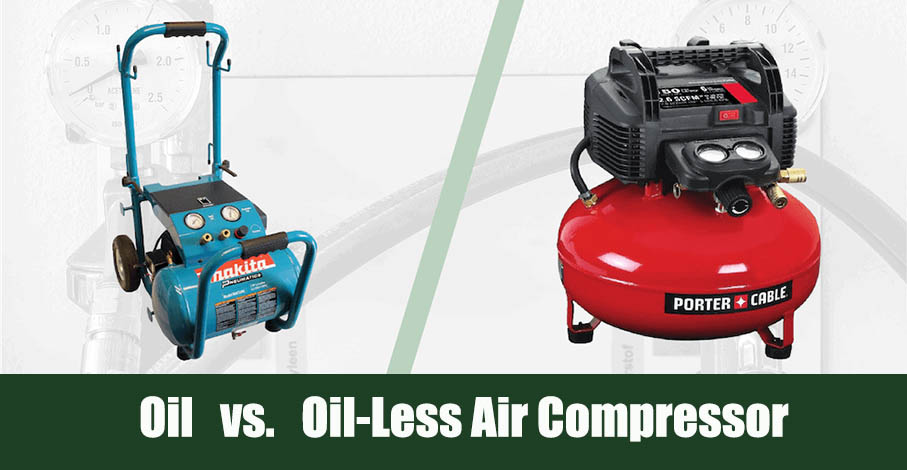

An air compressor is one of the most versatile tools you can buy. It can help you do everything from filling up the occasional bike tire to turning your garage into a car repair mechanic’s bay. Air compressors come in two primary varieties: oil air compressors and oil-less air compressors. And it can be very tough to decide between the two of them.
That’s where we come in. We’ve put together an in-depth comparison of oil and oil-less air compressors to help you understand how each one works and what their different pros and cons are. Keep reading to discover the answers to all of your questions!

Oil Air Compressor
When push comes to shove, most handymen prefer the oil air compressor. That’s because it is durable enough and powerful enough for individual handymen and commercial businesses alike. And these compressors tend to be quieter than oil-less air compressors. If you live in a tight neighborhood or suburb, your neighbors will appreciate you making less noise while using the compressor.
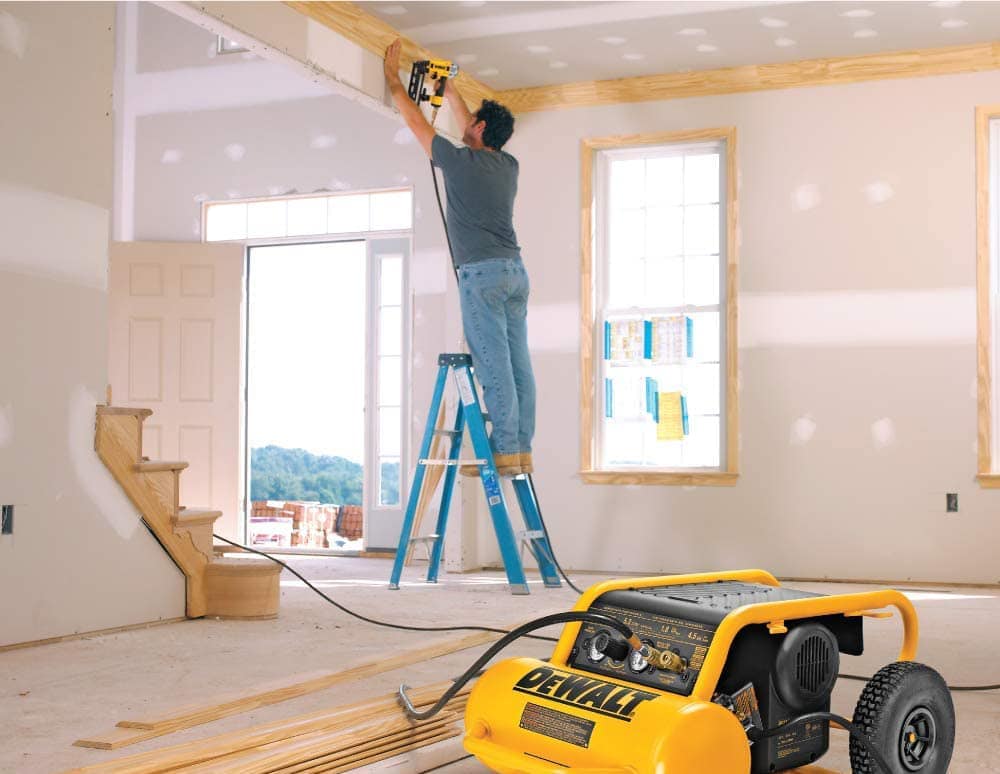
An oil compressor is powerful, durable, and quiet. But it does have some drawbacks, including the fact that it requires more maintenance. If you’re accustomed to monitoring and changing out the oil on other devices, this shouldn’t be much of a problem.
Additionally, oil air compressors are fairly heavy. This isn’t an issue if you plan to put it in one place and keep it there, but if you anticipate a need to move things around, you may want to go with a lighter compressor choice. However, there is a tradeoff; the heavy construction is a large part of why oil air compressors are so durable.
Overall, the oil air compressor is a great choice for handymen who have money to spend, need heavy-duty equipment, and have enough space for it. For everyone else, though, it’s worth taking a closer look at the oil-less air compressor.
- Durable
- Suited for heavy-duty work
- Relatively quiet
- Can easily operate for many hours at a time
- Heavy
- Additional parts to worry about
- Requires plenty of maintenance
- More expensive than an oil-less air compressor

Oil-less Air Compressor
When it comes to an “oil-less” air compressor, the name is not entirely accurate. The compressor arrives pre-lubed, and it is only oil-less in the sense that you don’t personally have to change the oil. The existing lubricant keeps the cylinder working while keeping the pump protected, making the maintenance on this tool surprisingly easy.
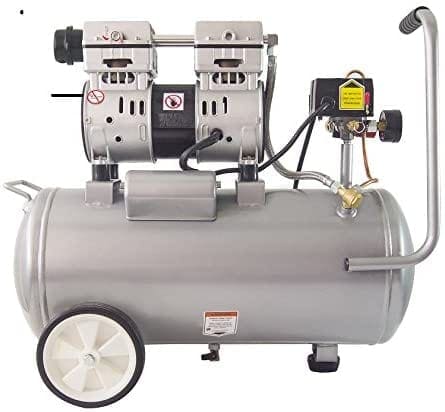
The actual compressor shape is different for oil-free compressors. Generally speaking, they are smaller and simpler than oil air compressors, and they weigh much less. And the lightweight nature of the compressor makes it very portable, which is a good choice if you intend to move the compressor in and around your home.
Why, then, do most workers ultimately prefer an oil air compressor to an oilless one? While these compressors are lighter in weight, they are far less durable and more prone to damage. And while not changing out the oil is convenient, the relative lack of oil means these compressors heat up more than their oil compressor cousins. That lack of lubrication also makes these compressors likelier to break down during use.
Finally, oilless compressors have slower motors and are very loud to use. While it is low-maintenance and very portable, they may be very disruptive to your home and your neighborhood due to the noise.
- Low-maintenance
- Lightweight and portable
- Lower cost
- Less durable
- Likelier to overheat and break down
- Loud
What Features Should You Look For?
Now you know the key differences between an oil air compressor and an oil-free air compressor. However, once you choose between the two types, there are still a few features you should consider.
Below, we have a brief overview of these features. This should give you a better idea of what you need before you make a purchase.
Horsepower
Every air compressor should advertise its horsepower. But if you’ve never used an air compressor before, you may not realize exactly why horsepower is so important. To sum it up, more horsepower adds up to a more powerful air compressor. And this power may be needed for your projects, especially heavy-duty ones. But if you only need a compressor for smaller tasks, you can get away with a lower horsepower model.
Keep in mind that compressors may not always reach the maximum listed horsepower. You may want to “play it safe” by getting a compressor that exceeds the maximum horsepower you will need.
Air Pressure
When you check listings and reviews for air compressors, one of the biggest factors is the air pressure, which is measured using PSI (pounds per square inch). There is no magic number for PSI, but we generally recommend getting a compressor with at least 90 PSI. If you only need the compressor for smaller jobs (like filling the tires for your bike or car), it’s okay to have a lower PSI model.
Tank Size
Different manufacturers may focus on the tank size of their air compressors. But does size really matter when using a compressor? The answer is both “yes” and “no.” The only time it really matters is when you have a very small air compressor. The small design means that you may be unable to run that compressor for a long time continuously.
Otherwise, tank size is largely moot because the compressor constantly fills the tank while in use. And if you buy a compressor with a tank larger than you actually need, you are just adding more weight and more maintenance that you’ll need to deal with in the future.
- You have heavy-duty jobs ahead of you
- You need a durable tool
- You don’t mind maintenance
- You need a quieter tool
- You don’t mind paying more
- You have small jobs around the house
- You won’t be using it as much
- You want minimal maintenance
- You don’t mind the noise
- You want to save money

Quick Look: Our Top Choices
| Rating | Image | Product | Details | |
|---|---|---|---|---|
Our Favorite Oil Air Compressor
 |
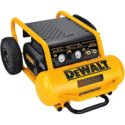 |
DEWALT D55146 Air Compressor |
|
CHECK PRICE |
Our Favorite Oil-Less Air Compressor
 |
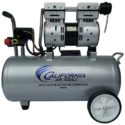 |
California Air Tools 8010 Steel Tank Air Compressor |
|
CHECK PRICE |
Our Favorite Oil Air Compressor: DEWALT D55146 Air Compressor
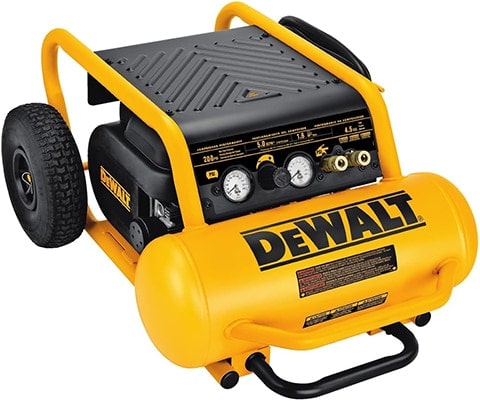
If you need an oil air compressor and don’t mind spending an extra few bucks, we recommend the DEWALT D55146 Air Compressor. It offers an impressive 225 PSI storage tank and a really powerful engine. As an added bonus, it is very quiet and easy to store, which is great if space is at a premium in your home.
Our Favorite Oil-Less Air Compressor: California Air Tools 8010 Steel Tank Air Compressor
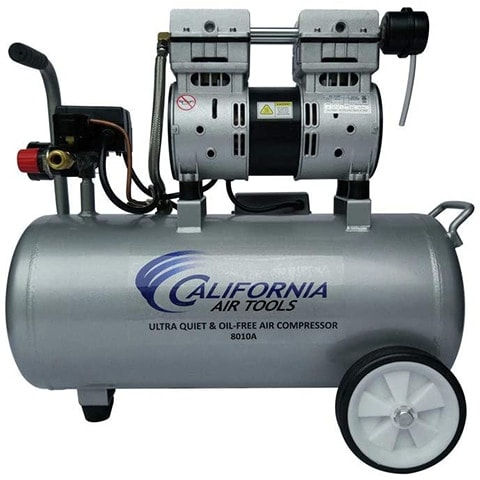
If you’re looking for an oil-less air compressor, we recommend the California Air Tools 8010 Steel Tank Air Compressor. It fills up very quickly (a little less than three minutes) and is surprisingly easy to use and quiet while running. To top things off, it’s affordable.

Conclusion
Now you know everything you need to know about oil air compressors and oilless air compressors. Ultimately, your choice all comes down to how much you want to spend, how long you need the tool to last, how quiet you need it to run, and how big the jobs ahead of you are.
Just be careful when making your choice. An air compressor is an investment, and you’ll want to choose a model with many years of life ahead of it!
More Air Compressor Guides:
- Pancake vs Hot Dog Air Compressor & Which is Right for Your Needs?
- Which 30-gallon air compressor is best?
- Looking for a quiet model? Check out our list here
Contents

